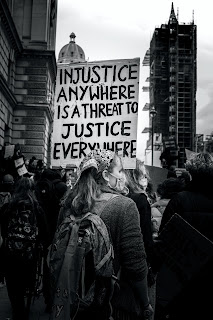Day 3 - Dangers of the professionalization of helping and expertism, and an emphasis on individualism
Day 3 - Mary Watkins' (2019) book, Mutual Accompaniment and the Creation of the Commons, opens with this epigraph, by Lilla Watson.
How does this quote help us to bring a critical consciousness to the work of expressive arts therapy? Given the professionalization of "acts of helping" (Watkins, p. 1) how do we bring a critical consciousness to the very practice of "therapy" and "counseling."
Watkins (2019) notes that she has decided to
move away from models based on individualism and unidirectional helping to those that acknowledge our inherent interdependence and potential mutuality. I turn away from expertism and toward mutual, dialogical, participatory, and horizontal relations… Through the assumption of professionalized roles based in “expert” knowledge, these practices too often usurp the understandings and agency of those they intend to help. (p. 1).
For Watkins, the answer is to intentionally move away from "psychotherapy and social service" towards mutual accompaniment. She offers a critique of psychotherapy, which she notes, "often proceeds from an individualistic orientation, stripping human beings of the wider social, economic, environmental, and political contexts in which their lives develop, and which give meaning to their distress and symptoms" (p. 1).
So, can the practice of expressive arts therapy and mental health counseling take these contexts into account?? How do we train students to do so? Goodman et al. (2004), nearly 20 years ago, proposed that the training of counseling psychologists include training in social justice. They note that this training will help trainees put feminist and multicultural principles into action, thus making them agents of social justice. Does our current curriculum emphasize these principles? Do we prepare students to become social justice agents who acknowledge, recognize, and understand the ways that "wider social, economic, environmental, and political contexts" shape their own lives, the lives of the folks with whom they work, and the meanings each make of the distress and symptoms experienced?
Goodman, L. A., Liang, B., Helms, J.E., Latta, R. E., Sparks, E. & Weintraub, S. R. (2004). Training counseling psychologists as social justice agents: Feminist and multicultural principles in action. The Counseling Psychologist, 32 (6), 793-838.




Comments